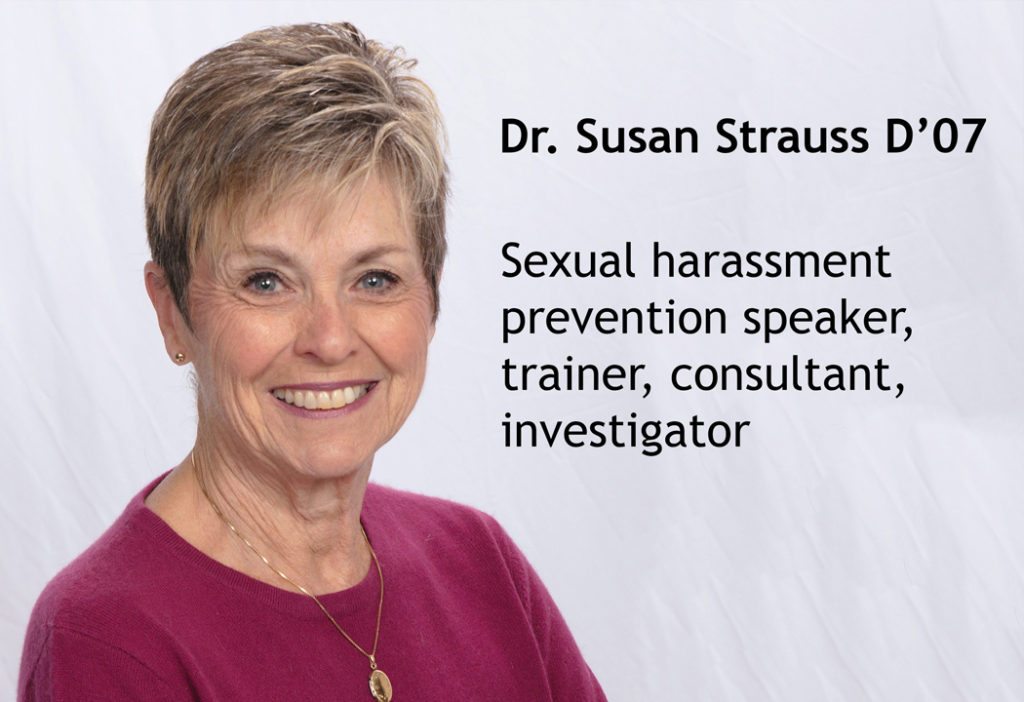
Dr. Susan Strauss believes educational system must step up to play a larger role
The list of high-profile men — in media, in sports, in entertainment, and in politics — who are being fired due to inappropriate sexual behavior continues to grow longer.
Susan Strauss D’07, for one, isn’t surprised.
“I guess what surprises me is that finally it’s all erupting; there are women coming forward to proclaim what they’ve experienced for years, but they had never felt safe in coming forward before,” she said. “But does it surprise me that these men are guilty of it? No, not in the least.”
Although the “#Me Too” movement is empowering women to come forward, Dr. Strauss — a national and international speaker, trainer, consultant, investigator, and an expert witness for harassment and bullying lawsuits — said the focus needs to be on how we create a culture where women are respected and no longer subjected to this harassment.
And she believes it begins with the education system. “It’s an important issue and it needs to get out,” she said. “It doesn’t just erupt once they get a job. These men have had a lot of practice in K-12, and it’s not being addressed there.”
A registered nurse as well as an accomplished author and expert witness, Dr. Strauss offices out of Burnsville. Her training and consulting work has taken her around the world, where she has counseled businesses, government, healthcare, and education organizations. Not surprisingly, she’s been interviewed on numerous local, international, and national media outlets including NBC Nightly News, World News Tonight, the New York Times.
An alumna of Saint Mary’s Ed.D. in Leadership program, Dr. Strauss knows, from her research and consulting experience, that a large percentage of women in the workforce are being sexually harassed, and many are never reported. But how do we even begin to make a change?
Too often boys being aggressive is passed off as “boys being boys,” she said. “We have to examine how our society sustains patriarchy and misogyny. We have to look at how we educate little boys to view little girls as people, and not as inferior. As much as we tell little girls they can be anything they want to be, we need to be sure little boys know that too. They can be a ballet dancer or play the violin, and they don’t have to play football. The box of masculinity needs to be countered. It starts in the home, and then in school they reinforce gender norms and stereotypes.
“If boys are taught to express their feminine side and girls are taught they can express their masculine side in the home, then they get into schools and are harassed because they don’t fit the gender stereotype,” Dr. Strauss said. “Teachers will discriminate too, not even intentionally or consciously. They will call on boys more often. They don’t believe they do until they are videotaped and shown. They allow boys to yell out answers while girls raise their hands. We reinforce those gender norms that way. We need to look at how we perpetuate male superiority.”
Dr. Strauss believes the educational system, at every level, needs to play a conscious role in battling harassment and bullying. “We have to have speakers about this. But merely having speakers and conducting training to faculty and staff and education to students isn’t enough she said. We need to address the issues from a systems perspective. We need to have teachers trained about unconscious bias and how that presents itself in the classroom. We need to offer specific coursework. And in higher education, it needs to be integrated into every academic discipline. How does sexual harassment impact economics, for example? Are there classes about gender studies that include masculinity and feminism? Often, I hear there are classes about feminism, but where are the classes that deal with masculinity to challenge men’s introspection?”
In the end, Dr. Strauss said there is much work to be done to counteract a culture where sexual harassment is the norm, which is why she decided to become a consultant full-time about 15 years ago.
Not long after, Dr. Strauss went back to school for her doctorate. She heard about Saint Mary’s from a friend. “She said, ‘I have found a university that fits with our values and beliefs.’ I was 54, but I had always wanted my doctorate and like to learn, so I registered,” she said. “I loved it. I thought it was very rigorous, and it was an excellent fit.”
For her dissertation, Dr. Strauss was able to conduct research that was especially meaningful to her as an RN. Her dissertation was titled, “Quantitative and qualitative analysis of physician abuse as gender harassment to female and male registered nurses in the operating room.”
“Saint Mary’s had a couple of different tracks in leadership. One was more organizational, which fit beautifully with what I do as a consultant. It worked perfectly for me.”
Dr. Strauss admits that her work can be both stressful and exhausting. “My passion is providing training and strategic development to organizations seeking to create respectful, healthy workplaces free of discrimination,” she said. “It gives me purpose, and I hope to make workplaces a little bit better. It makes me angry that it occurs in the first place, but my work gives me a place to focus my anger.”

Recent Comments